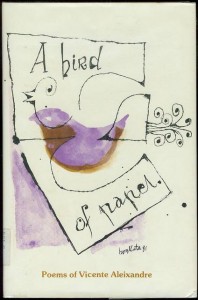Another prominent exile was Alejandro Cioranescu (b Romania 1911 – d. Tenerife 1999) doctor Honoris causa of the University of Tenerife at La Laguna – an expert on the Spanish baroque and on the French-Spanish bibliography his books Estudios de literatura española y comparada (La Laguna, 1954), El barroco o el descubrimiento del drama (La Laguna,1957), Los hispanismos en el francés clásico (Madrid, 1987) and Bibliografía franco-española, 1600-1715 (Madrid 1977) remain to this day standard references in the field.
Amongst the ‘greats’ of universal literature who found exile in Spain was Horia Vintila (1915, Romania – 1992, Spain) who wrote directly in several languages including Spanish in which he published several novels Marta, o la segunda guerra, (Barcelona, 1987), Persecutez Boèce!, (Barcelona, 1983), Un sepulcro en el cielo, (Barcelona, 1987). He was the nominee of the prestigious French literary Prix Goncourt in 1960 which he was compelled to renounce following a character-assassination witch hunt masterminded by the Romanian secret services through the French left-wing press. It is worth noting that the novel in question “Dieu est ne en exil” which was translated in fourteen languages was NOT a political novel and it was inspired by the life of the exiled Roman poet Ovid who died on the Romanian shores of the Black Sea.
Horia Vintila was also a prolific essayist and literary critic in Spanish with titles such as: Presencia del mito, (Madrid, 1956), Poesia y liberdad, (Madrid, 1959), Espana y otras mundos, (Barcelona, 1970), Mestor de novehita, (Madrid, 1972), Introduccion a la mundo peor, (Barcelona, 1978), Literatura y disidencia, (Madrid, 1980), Los deechos humanus, la novsledel sigle XX, (Madrid, 1981). Horia Vintila was professor of Universal Literature at the Official School of Journalism and later founded the Chair of Universal Literature at the Complutense University in Madrid.
During the last two decades an expert of Romanian literature is the former director of the Instituto Cervantes in Bucharest, Joaquin Garrigos Bueno a prolific translator of more than 30 Romanian novels in particular of Mircea Eliade (Boda en el cielo, Diario intimo de la India, Los jovenes barbaros, La noche de San Juan) and Emil Cioran (El ocaso del Pensamiento, El libro de la quimeras, Brevario de los vencidos,) but also of Camil Petrescu, Emil Voiculescu, Liviu Rebreanu and other classics and contemporary writers.
[Read more →]


